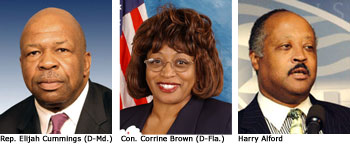-Staff Writer-

WASHINGTON (FinalCall.com) – While many government officials tout the availability of stimulus funds, for the average person, finding these dollars can be a journey through a maze of websites that can be frustrating.
Black lawmakers, and advocates say don’t let a little research keep you from trying to access federal money–or perhaps more accurately, your own tax dollars.
In February, Congress approved the Recovery and Reinvestment Act of 2009. The act was designed to save and create more than 3.5 million jobs, computerize Americans’ health records, revive the renewable energy industry, undertake the largest weatherization program in history, increase college affordability for seven million students by funding the shortfall in Pell Grants, and provide a new higher education tax cut to nearly four million students.
It is also supposed to provide a $150 billion investment in new infrastructure projects–roads, bridges, and mass transit systems–provide an $800 Making Work Pay tax credit for 129 million working households, cut taxes through an expansion of the Child Tax Credit and an unprecedented level of transparency, oversight, and accountability.

Rep. Elijah Cummings (D-Md.) explained to The Final Call that the stimulus money has been divided and dispersed in thirds. “One third went to tax cuts for everyone working who makes under $150,000. People are seeing more on their paychecks. It may not be much but people are forgetting about that aspect. Another third went to states to stabilize employment. Unemployment benefits have been extended. Black people have gotten those dollars,” he said.
“Another third has gone to contracts to repair the infrastructure and create jobs. Minority contractors have gotten some of this money. They are employing people and doing good in their community.”
Federal stimulus money is distributed through state governments.
“So who is getting the money depends on where you live,” said Rep. Cummings. “In Maryland we’re doing very good and we’ve made it our business to hold the governor accountable for distributing money to minority contractors and to minority communities.”
“But I heard Con. Corrine Brown (D-Fla.) complaining that the money was not trickling down to her communities. If other states don’t have the leadership to push it through, it’s not getting to the people,” the congressman admitted.
If you don’t live in an area where the legislators are pushing to make sure the money gets to the Black community, the first place to find out what’s going on is www.recovery.gov. On the site you can input zip codes and see how much money has come into your neighborhood and who received it. This can be a starting point for accessing recovery funds or organizing to get a piece of the federal stimulus pie.
Recovery.gov is the site for everything related to the president’s stimulus plan. If you are looking for a job the site directs you to two other sites to find recovery related jobs, www.usajobs.com and www.careeronestop.com. The site can also direct you to a contracts page to see businesses that have received recovery money. If you are a contractor, you can visit www.fedbizopps.gov to search for contracts.
Harry Alford, president of the National Black Chamber of Commerce, told The Final Call, “None of the routines have changed in how you will get money. If you were getting money and contracts before this crisis, you’re getting money now. The problem is, nothing is being done to ensure that Black and minority businesses are getting the contracts.”
“There’s still plenty of money to go through. I testified before Rep. Edolphus Towns (chair of the House committee on oversight and government reform) that Congress needs to tell local governments to ensure that diversity is implemented in their contracts or they will be fined or sanctioned. We’re plugging away trying to get contracts but so far it’s slim pickings,” Mr. Alford complained.
Cynthia Anderson, director of the Environmental Management Recovery Program, told a workshop audience Sept. 25 at the Congressional Black Caucus Annual Legislative Conference that states are supposed to go into socially depressed areas and offer jobs.
The Department of Energy is tracking zip codes to make sure that states were using the money in the most economically depressed areas and offering those residents jobs, she added.
“We want to make sure that those people who deserve opportunities get the opportunities. People may want to do business as usual but we’re not doing that,” she said. “People who get recovery money must now report back how they spend it for the first time. It’s open and transparent. Also for the first time companies must report their compensation too. This is unprecedented.
“There is so much control on this money that if anyone does anything illegal we will catch them. If you have any questions or problems about what we’re doing call 1-888-DOE-RCVY.”
Edward Hubbard, of the Renewable Fuels Association, talked about how recovery dollars are helping Black farmers. “We’re working with Black farmers to provide them with technical assistance to help build their infrastructure. We have a long history of working with them because they have a distrust of the federal government who has been slow in paying them. We are providing them with crop transition assistance. We’re helping them select crops they can transition to, to bring a greater yield. We’re also helping them get the right seeds at the right price.”
Rep. Cummings cited a weatherization program in Baltimore that just graduated 30 Black men and women. “The program trained them to do weatherization. They got immediate jobs. They were unemployed before this crisis,” he said.
But finding these programs in your community may be a challenge. After searching www.recovery.gov, check state sites and congressional legislatures for what’s being done in your community.
Syndicated radio personality Warren Ballentine doesn’t think the recovery is working for Black people.
“We’re not getting the money. It’s not trickling down to the majority of us who need it. We need to do something else. We surveyed certain zip codes in the two of the most impoverished neighborhoods in Chicago that were next to each other. Those neighborhoods spent $52 million in lottery tickets over the past 18 months,” he told The Final Call.
“Imagine what we could have done in our community with that kind of money. We could develop our own things and take care of ourselves. I’m encouraging my listeners to invest in ourselves with a Community Reinvestment Campaign. I’m telling people not to shop on Black Friday (the day after Thanksgiving). Save that money and do for self.”
John Hope Bryant, chair of Operation Hope, believes Black America needs a new attitude to recover. “Anyone who believes prosperity will come back like it looked five years ago is on medication. I do believe there will be a recovery but we have done so much, for so little, for so long that we can almost do something with nothing.”
“The concept that we’re going to get corporate jobs is a myth. We lose 50 million jobs globally each year. We have to create a generation of Black and Brown entrepreneurs. We can do it that’s the new vision,” he said. “We’ve made dumb sexy. We need to make smart sexy. We have to show kids how to do well and get rich legally.”












